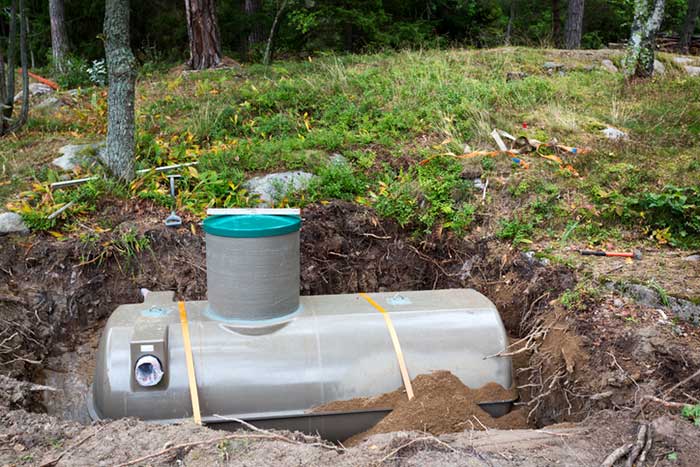
If you’re like many of us, you may find the septic system a bit of a mystery. You probably have a vague understanding of how it works, and maybe you know that it involves a drain field and a tank, with the knowledge that it should be cleaned out every few years. If a clog happens, and the wastewater pipe leaks and backs up, homeowners with septic systems can sometimes not know what to do – and that can be exacerbated during freezing temperatures and the freezing problems that can come from the frozen ground and holding tanks.
Otherwise, you probably don’t think about the septic system much until there’s a problem. Fortunately, as a homeowner, you can prevent many mishaps or common issues through regular maintenance and care, but what about when the weather causes your septic tank problems?
Does Cold Weather Affect Septic Systems?
Yes. Cold weather affects septic systems much like how the winter season affects pipes, drains, and plumbing systems in general. If a homeowner does not have a septic system prepared for the weather, or the homeowner isn’t prepared for the winter season in general, an assortment of septic tank problems could occur. Even though septic tanks are in the ground, covered by dirt and layers of snow during the winter, this doesn’t prevent the system from being unaffected, and it actually makes it more susceptible. All weather can have an effect on your septic system, but mostly, the winter weather can be hardest on your septic tank, and here’s why:
Low Temperatures
The low temperatures make it difficult for your septic tank’s bacteria to survive. The septic tank doesn’t just fill up with waste and wait for someone to pump it out; it uses microscopic anaerobic bacteria to physically digest the waste so that only water and carbon dioxide are left. Whatever waste the bacteria leaves behind settles to the bottom of the tank as sludge, and if there aren’t enough bacteria, the sludge can build up and become a problem. Unfortunately, the bacteria in septic tanks are sensitive to temperature and tend to slow down or even stop when the temperatures plunge below about 50°F. Combine this with the increased load placed on your septic system during the winter months due to house guests and fatty foods, and you’ve got a recipe for disaster.
Frozen Septic Tank
Septic system freezes can sometimes also be the pipe coming from the home to the septic tank and not the holding tank itself. The freezing temperatures of wintertime can cause homeowners to consider running antifreeze additives to their septic systems – don’t let the cold temperatures cause you to run antifreeze in your system, it can interfere with the anaerobic bacteria in your tank, which is needed for effluent disposal.
When Frozen Water Thaws
Cold weather can also wreak havoc on your septic system when the frozen water thaws. This sudden flow of thawing water can saturate the drain field, making it impossible for water to drain from the septic system. This causes the water to travel backward, moving through your pipes and into the toilets and drains inside your house. Flooded drain fields can also send untreated sewage into the groundwater and local bodies of water, leading to environmental contamination.
Otherwise, you probably don’t think about the septic system much until there’s a problem. Fortunately, as a homeowner, you can prevent many mishaps or common issues through regular maintenance and care, but what about when the weather causes your septic tank problems?
Septic System Preventative Maintenance in Cold Weather
Prevention is the most effective way to deal with septic tank issues. Even issues caused by cold weather and snow cover can often be avoided with a little bit of proactive septic tank maintenance.
- Keep up with routine service, having it emptied every few years.
- Seed your septic tank with bacteria that function well in cooler temperatures.
- Make sure you’re allowing the bacteria to thrive by avoiding cleaners that contain bleach or have antibacterial additive properties.
- Never park, drive, or use heavy machinery over the drain field.
- Keep your gutters clean, and point all gutters away from the drain field area, so excess water cannot cause a frozen septic system issue with frozen ground in your leach fields.
- Have a riser, as risers allow for easy access to the tank, even if there is a freeze-up that causes components of your septic system, such as frozen pipes from the home to the holding tank. Ensure a professional installer is used for installing a riser on your septic tank.
If a problem occurs, call a professional. If you think your drain field is flooded, try reducing water usage to relieve pressure from your septic system. Don’t flush the toilet any more than necessary, limit the number of showers, and don’t run the dishwasher or do laundry until the drain field has had a chance to dry out, and of course do not run water, cold or warm water, from your faucets continuously to try and unthaw your frozen system tank. It’s not advisable to have the septic tank pumped when it’s flooded, as that can cause damage. However, if you believe there’s a problem with your septic system, it’s important to get advice from an expert plumber as soon as possible.
Septic System Preventative Maintenance in Cold Weather
There are more common septic problems than those that occur during cold weather. Homeowners with a septic system can experience sewer line clogs similar to homes attached to a city’s sewer system. Septic systems also can have an increase in odor or sewer smells more than regular plumbing because of how full the tank is or if there is a blockage in the vents, or due to other reasons.
If you’re facing septic system problems, it’s important to know when you’ve exhausted all your DIY resources and septic system know-how and call in a professional. Septic systems are unlike regular plumbing systems and require an extra level of experience and knowledge that not every plumbing company has. Before calling just any plumbing company that offers septic service, do a little research to make sure they are a quality company that can fix your septic system issue, especially if it’s during the winter season.
When it’s time to service your septic system, trust A-1 Sewer & Septic Service Inc. to provide fast, friendly, efficient service at a reasonable cost. Having served the residents of the Kansas City Metro Area since 1968, we are focused on customer service and satisfaction and will work hard to help you solve your problem before more damage is done. Visit our site to learn more, or call us at 913-631-5201 any time of day or night for emergency services or to get a quote.

